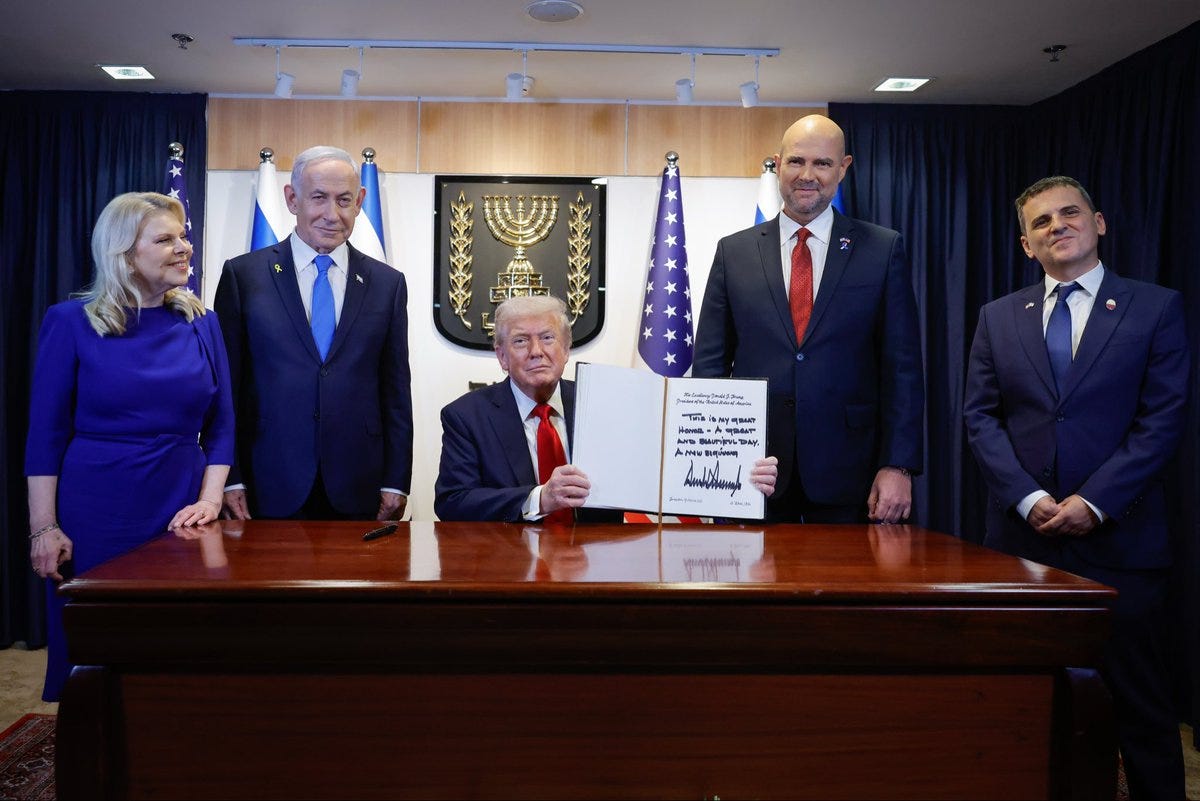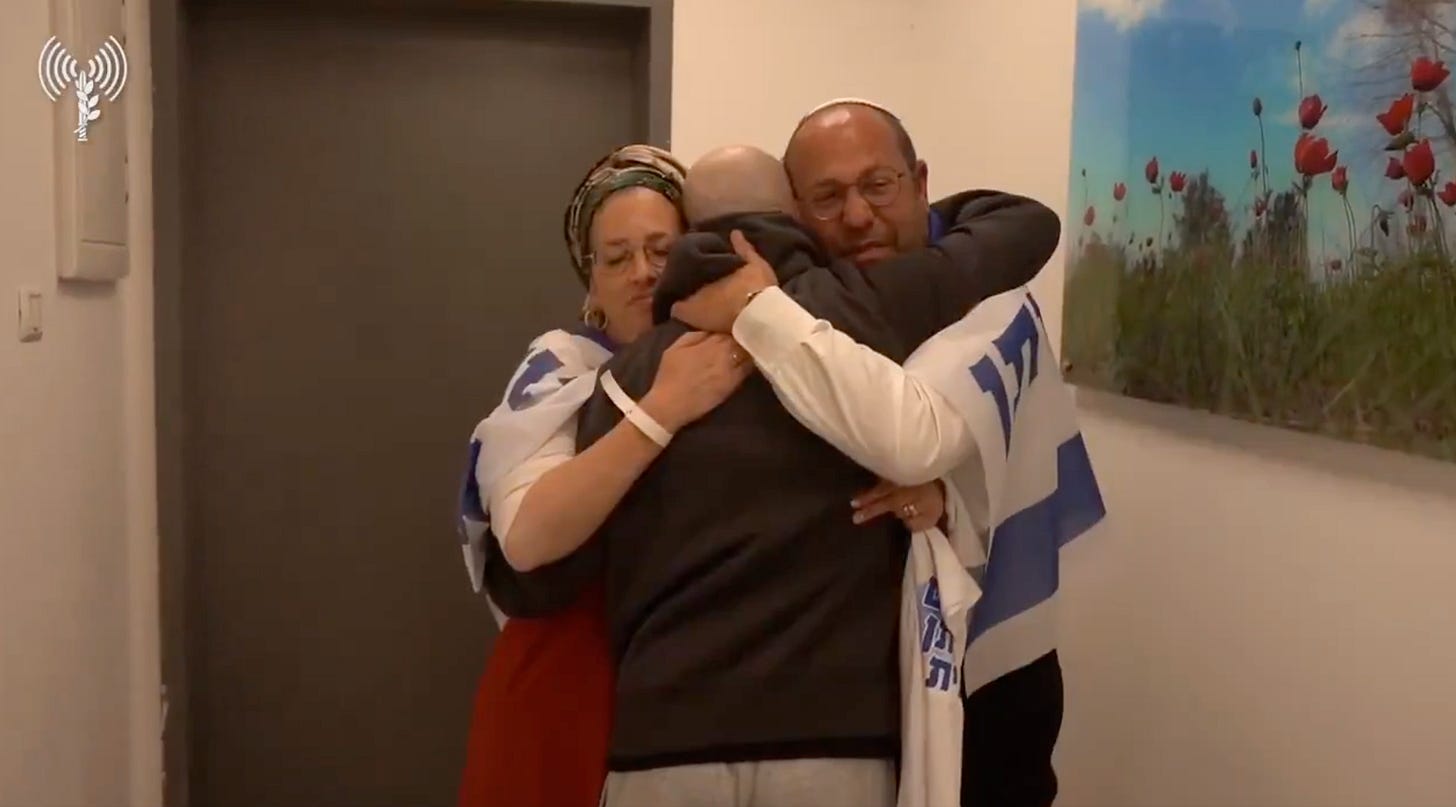Ceasefire, Hostage Deal Takes Effect in Gaza
“This is the historic dawn of a new Middle East,” Trump says.
Two years and six days after the October 7th attack that launched the longest and deadliest war of the modern Israeli/Palestinian conflict, a ceasefire has taken hold in Gaza.
The last 20 living Israeli hostages in Hamas captivity were released this morning, while 250 Palestinian prisoners serving long and life sentences are in the process of being released by Israel, as are more than 1,700 Palestinian detainees who were being held by Israel without charges.
President Donald Trump is currently in the region, where he will participate in a peace summit in Egypt later today. Earlier this morning, he received a raucous reception as he addressed the Israeli parliament, the Knesset. “This is not only the end of a war,” Trump said. “This is the end of a age of terror and death, and the beginning of the age of faith and hope and of God.”
Trump, aided by his special envoy Steve Witkoff and son-in-law Jared Kushner, played a key role in brokering the ceasefire agreement, marking the most significant diplomatic accomplishment of his second term — and one of the marquee achievements of either of his stints in the White House. “This is the historic dawn of a new Middle East,” Trump told the Knesset.
What have two years of war wrought?
First, an enormous death toll. More than 67,000 Gazans and more than 2,000 Israelis have been killed during the war, according to each side. The World Health Organization estimates that another 42,000 Gazans — one in four of whom are children — have life-changing injuries after the conflict, including those with severe injuries to arms and legs (around 22,000), to the spinal cord (around 2,000), to the brain (around 1,300), and major burns (around 3,300).
According to the UN, more than 90% of homes in Gaza have been damaged or destroyed during the war, displacing nearly all of the 2.3 million Palestinians who live there.
The protracted war has also done much to change the power dynamics of the Middle East.
Israel is at once strengthened and isolated, having significantly weakened Iran’s “Axis of Resistance” — not just Hamas in Gaza, but also Hezbollah in Lebanon and the Houthis in Yemen, as well as Tehran itself — but emerged with a markedly changed global reputation. A Morning Consult survey last year found the war had decreased opinions of Israel in 42 out of 43 countries polled; in the U.S., a recent New York Times poll found that more Americans sympathize with Palestinians (35%) than with Israelis (34%), for the first time since the newspaper began asking voters about the conflict in 1998. (31% said they were unsure or backed both equally.) Views of Israel have especially plummeted among Democrats and young Americans of both parties.
Over the course of the war, Israel was accused of committing genocide by a United Nations commission, while countries like Australia, Canada, France, and the United Kingdom have announced recognition of a Palestinian state, partially as a rebuke to Israel’s military campaign in Gaza.
Hamas leaves the war intact but significantly degraded — and isolated from its own allies. Echoing many Gazans who urged the group to agree to a ceasefire, Arab nations like Qatar pushed Hamas to give up the Israeli hostages after being attacked by Israel itself last month; similarly, Iran appears to have lost its appetite for backing the organization after a twelve-day war with Israel in June, during which the U.S. bombed three Iranian nuclear sites.
In the last two years, the entire top leadership of Hezbollah was killed by Israel; Syrian president Bashar al-Assad, another Iranian ally, was toppled; and Hamas was depleted from an “organized army” into “scattered groupings of fighters.”
After several near-ends to the war, including a short-lived reprieve negotiated during the waning days of the Biden administration, the current ceasefire was struck after mediators with ties to both sides exerted leverage to end a war they had tired of tacitly (or financially) supported.
“I said, ‘Bibi, this is your chance for victory.’ He was fine with it,” Trump told Axios, recounting his conversations with Israeli Prime Minister Benjamin Netanyahu. “He’s got to be fine with it. He has no choice. With me, you got to be fine.” Meanwhile, according to the Wall Street Journal, Qatar and Turkey told Hamas that if they didn’t accept the proposal before them, they would no longer host the group’s political leaders; Egypt said it would stop pushing for Hamas to play a role in Gaza’s postwar governance.
Indeed, the future of Gaza remains very much unsettled. Trump presented Israel and Hamas with a 20-point peace plan. Of those, four points have mostly already happened: Israel has returned to an agreed-upon withdrawal line, Hamas has returned the living Israeli hostages, Israel has returned Palestinian prisoners, and new humanitarian aid is flowing into Gaza. (Cooking gas entered the strip last night for the first time since March.)
But one of the four points has not been fully completed: Hamas was supposed to return the bodies of 28 Israeli hostages who died in captivity today; only four have been released so far.
And then there are the 16 other points that go beyond this war, and speak to the future of Gaza and the Israel/Palestinian conflict. These include a pledge by Hamas to lay down its weapons and play no role in the governance of postwar Gaza, and the creation of a committee of Palestinian technocrats who will govern the territory (with oversight provided by an international “Board of Peace,” which Trump has volunteered to chair).
These details — yet to be accepted by Hamas — will be the subject of today’s summit in Egypt, with Trump in attendance. Mahmoud Abbas, the president of the Palestinian Authority in the West Bank, will be on hand as well.
Trump reportedly urged Netanyahu to attend, but the Israeli leader — who faces his own domestic troubles, including disputes with right-wing allies who had called for the war to continue — declined the invitation, citing a Jewish holiday that starts tonight.
As much as it took to end the war, agreeing on what comes next will only be more difficult.





There have been numerous speeches predicting that this is the beginning of a lasting peace in the Middle East. I’ll believe it when I see it.
Whilst you reporting serves to raise awareness of events primarily to your national readers,
it is a far cry from really presenting the real impacts to the global community.
I encourage you to read this briefing,
https://progressive.international/wire/2025-10-07-pi-briefing-no-37-the-plan-to-colonize-palestine/en
"On 29 September 2025, Donald Trump and Benjamin Netanyahu presented their so‑called “peace plan” for Gaza — a blueprint for the further colonization of Palestine and the co-optation of those who stand in solidarity with its people.
Announced from the heart of empire and immediately endorsed by those most invested in preserving the settler colony, the plan aims to turn a shattered Gaza into a laboratory for trusteeship, securitization, and profit — with Palestinians reduced to objects of management rather than subjects of history ..."
For our common humanity,